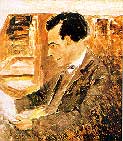
|
|
|
| History of Portuguese Literature | Origins of Portuguese Literature | The Portuguese Language | Oral Literature | Fiction | Lyricism |
| Travel Literature | Cantigas de amigo | Historiography | Doctrinal Prose | ||
| Baroque and Mannerism | Classics | Existentialism | Experimentalism | Enlightenment | Modernity |
| Neo-Realism | Post-Modernism | Realism | Romanticism | Saudosismo | Symbolism |
Saudosismo
|
|
This
is a tendency in Portuguese literature that is rooted in the work of Teixeira
de Pascoaes and the Renascença
Portuguesa group. We may also consider that a number of other writers, who
to some extent remained on the fringes of their contemporary aesthetic movements,
were connected with it, such as Afonso
Duarte (even though this author had links with the psychologism of the
generation developing around the magazine Presença
and has generally been claimed as an aesthetic companion of some neo-realists)
and Tomás da Fonseca (who were,
however, like Ferreira de Castro and Aquilino
Ribeiro, also recognised as predecessors of the neo-realists) or Irene
Lisboa (who can also be included amongst the Presença
generation).
Saudosismo
(broadly speaking a nostalgic yearning for the good things of the past) has
several points of contact with the movement known as “Integralismo
Lusitano” (Portuguese Integrationalism), associated with the poet António Sardinha), but its harking back to the past is more closely
related to a lyrical attitude than to any sense of political action.
 Portrait of Teixeira de Pascoaes by Raul Brandão |
© Instituto Camões, 2001